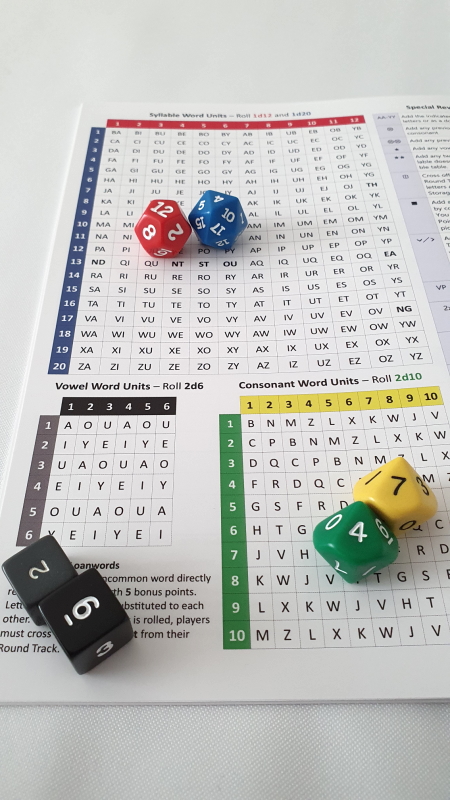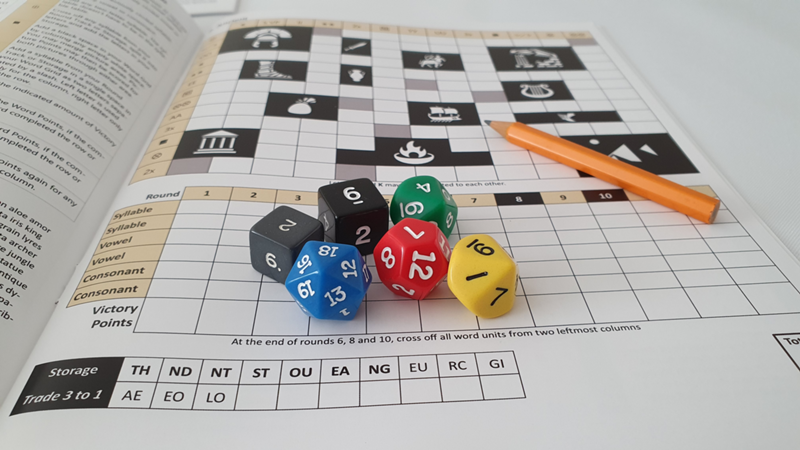


Hajiku Nemoly
Requirements
Description
Hajiku Nemoly is a challenging roll-and-write word game inspired by Nordic-style picture crosswords. The game booklet includes 12 thematic scenario grids, each with their own special rules.
All scenarios are naturally suited for solo play with minimal rules differences. Additionally, all word grids may be solved like classic fill-in puzzles with some tricky new twists (the last page of the booklet has instructions and clues for the puzzle variant).
Rules Summary
The game lasts 10-12 rounds, depending on scenario. Each round has three phases: roll, write, and score.
- Roll: All six dice are rolled twice, and players collect the indicated letters and syllables. Special events may trigger, if previously rolled results are rolled again.
- Write: Players build complete words on their crossword grid (simultaneously and secretly) using the word units they have collected on the current round and on all previous rounds.
- Score: Completed words are checked and scored in four different categories: Letter Points (length), Word Points (prevalence), Picture Points (associatedness to adjacent icons), and Repetition Penalty (negative points for identical words).
Every word with at least 3 letters scores victory points for length, even if the word is complete nonsense. Meaningful words are categorized from Common to Uncommon to Rare, and even beyond that, may score points when one or two letters are wrong or missing. Bonus points are scored, if words are directly or indirectly related to adjacent pictures. Repeating previously completed words or completing the same word with another player inflicts a harsh penalty.
Completing rows and columns gives special rewards: wild letters, double victory points, or eccentric single-use abilities that allow players to split a letter space or bend a word in the middle.
At game end, the players who completed the longest Common or Uncommon words get final bonus points. The player with most victory points wins.
Players always start with some syllables or letters in their Storage.
Design Story of Hajiku Nemoly
As a kid in the 80’s, I wasn’t a big fan of word games – possibly because the only word game we had back then was some old version of Scrabble. It had a very bare-bones rulebook and we weren’t old enough to understand all the rules either, so every game turned into an argument over which words were allowed and which were not. Having a single dictionary as a guide wasn’t a thing (I’m not sure we even had a dictionary in the house back then) and creating words in our local Finnish dialect was a natural house rule. Admittedly, it was often me who bullheadedly insisted that words like “mehtä” and “mettä” should both be allowed, or that adding -t at the end of a word turned it into a new word.
Back then I also had a side-hobby of filling crossword puzzles from old magazines, especially those Nordic-style crossword puzzles with word arrows and picture clues designed around a theme (and waaay too often that theme was sports). However, I often filled the grids with words that were more amusing to me in relation to the pictures than the actual solutions. A picture of a famous singer-songwriter? That’s Happy Sadface, obviously. The clue is ‘god of war’, four letters? The answer is Pete because MacGyver is on TV.
Now, several decades later, I’m still in the same figurative boat when it comes to word games: not a fan. And that seems a bit unexpected because I enjoy creative writing, I like learning different languages, and I love board games in general. So why aren’t word games more appealing to me? Is it just me, or is there something wrong with word games? Usually it’s how the words are restricted, judged and scored that turns me off: the stricter the word rules, the less I care to play. Even when it comes to e. g. writing poetry, following a strict verse metre feels like putting on a straitjacket; I immediately turn into an escapologist. For me at least, language as an entertainment necessitates creative flexibility on all levels.
The seemingly paradoxical flip side is that I also avoid performance-type party games where players have to shout out random words or come up with “hilarious” non-words for ephemeral entertainment. Writing nonsense verse is one thing and improv theater is another, but turning those activities into a cursorily codified tabletop game doesn’t seem to work for me either. There is a weird sense of tawdriness to it – like publishing an abridged version of a classic novel. If you make a board game, it should involve some tactics or strategies, and points should matter; a game needs to be a game for me, not just an activity; a meal needs to be a meal, not just a quick snack.
Another point is that majority of word games are marketed for parents to play with their kids as an educational experience, so obviously most of them are simple mass market games. Language is something meant to be learned and used seriously in the real word, after all, not just an abstract throwaway game mechanism. Parents want their kids to learn (at least one) language properly instead of making up new words on the fly, or the next thing you know they’ll start using idioglossic words like “lol” and “yeet”, and eventually dictionaries have to accept them because they are in common use (and prescriptivists run screaming into the night).
But if you don’t put down strict rules for scoring words, is the only alternative an extempore scoring based on nebulous table consensus? Both extremities feel wrong to me. Is there no happy in-between? I know there are some word games out there that try to offer a balanced compromise, but unfortunately many of the games that I’ve seen have other problems for my selective taste – like the fact that I have burned out on deck building aka repetitive mash shuffling, or that I don’t really care for pure cooperative games aka decision-by-committee games – but those are whole different topics.
In January 2022 I happened to notice a word game design contest announcement at The Game Crafter website and decided to finally make that “heavy word game" that I’ve been thinking for a long a time – a word game that I would like to play; a word game with flexibility, but also some real crunchiness to it; a word game that doesn’t penalize creative expression, yet is not a structureless romp either.
I checked my folder for game ideas, shuffled through BoardGameGeek’s word game categories, and sketched down some framework:
1) the game had to be a crossword puzzle type thingy with picture clues, but something that works as a game rather than a puzzle, having many options instead of only one right option; 2) the game shouldn’t be limited to words of only one language, or one dialect, or only one way to write the words, or even limited to real words; 3) the game had to be playable solo in the same relaxed-yet-ponderous way you can fill a crossword puzzle over multiple hours or days on your own, maybe playing one brain-burning turn and then leaving the game on the table for the next day; and 4) the game had to have some modern design standards, like setup variation, and no player elimination or excessive downtime, and some challenge beyond “fastest player to create the shortest and most obvious word out of pretuned distribution of letters wins“.
After iterating about two weeks, these vague design restrictions (mixed together with nostalgic childhood memories) turned into the first prototype of Hajiku Nemoly: a collection of themed pictorial crosswords mashed together with a roll-and-write game, with flexibility to play with languages, multiple levels of correctness for words, and different scenarios and tactical options to maximize points with nonsense or induce penalties to other players. It still took 14 different versions to test and polish the design, but the core of the game worked from the start.
Now, when I look at all the word games on BoardGameGeek, I can honestly say that I’d rather play my own game than most of those. I think of myself as a very self-critical person (or at least I aim to nitpick my own designs using the same criteria I use to nitpick other people's designs), so I guess I can give myself a pat on the back when I’m actually contented with what I’ve created. It's not perfect, but better a gem with a flaw than a pebble without.
Speaking of which – if you create your own scenarios for Hajiku Nemoly, I’d like to play them!

Questions & Answers
Q: What is the meaning of the name Hajiku Nemoly?
A: The working title of the game was Apocope, but it changed to Hajiku Nemoly when I created the word unit tables (take a closer look at the syllable table to find the actual origin of the name). It just so happens that Hajiku means “flip”, ”snap”, ”flick” or ”pluck” in Japanese (and also just happens to be one letter away from ”haiku”). “Nemoly” is two letters away from “namely” and simply sounds like a good pairing to Hajiku. There’s no real deep meaning to the name, but you can certainly dig out multiple levels of playful meanings – for example, I’m sure my younger self would have appreciated that “flipping a namely” sounds like a weird euphemism for flipping a bird, just one finger off (in Finnish, the ring finger is called nameless finger).
Q: Are there any games that are similar to Hajiku Nemoly?
A: I haven’t been able to find another a) roll-and-write game that b) uses both random letters and random syllables, c) has multiple thematic scenarios d) with special rules, e) gives rule-breaking rewards for filling rows and columns, f) allows storing letters and g) trading letters into other letters, and h) offers multiple levels of 'correctness' with different victory point values, and also i) gives bonus points for relatedness to adjacent pictures. But if you try to find games where you build free-form crosswords from random letters on an empty grid, there are certainly many games like that – just to give one example, Voltaire (1995) is a simple solitaire game where you draw random letter tiles, place them on a grid to make words, and win by turning all the letters into words. The core mechanism is in the same ballpark, but that’s about it. That said, maybe the most similar “games” are just traditional picture crossword puzzles designed around a theme, or maybe word game apps like Wordscapes.
Q: Can I play Hajiku Nemoly with more than 4 players?
A: Yes, the 1-4 player count is just a practical compromise based on price and components. The game can be theoretically played with any number of players by taking copies of the scenario spreads.
Q: Can I buy a digital print-and-play version of Hajiku Nemoly?
A: Yes, go to Hajiku Nemoly: Print & Play PDF Edition.
Q: Can I get full solutions for the Fill-In Puzzles variant?
A: No, I don't want to give full solutions, but you can get some extra clues from Hajiku Nemoly: Fill-In Crossword Grid Clues (PDF).
Q: Where did you get the word grid icons?
A: All icons used in the game were created by Delapouite and Lorc at Game-icons.net and are under CC BY 3.0 license.
Q: Can I get a list of all the 12 scenario grid themes?
A: Western, Pirates, Space, Fantasy, Ancient, Games, Music, Farm, City, Contact, Painting, and Eastern.
Components
| Component | Quantity | Photo |
|---|---|---|
| {{item.name}} | {{item.quantity}} |
|
Vitals
| Average Rating | 0 reviews |
|---|---|
| Publish Date | April 17, 2022 |
| Edition | First |
| Department | Games |
| Tags | {{tag.properties.name}} |
See It In Action
Ratings and Reviews
{{review.properties.review|truncate(review.stash('truncate')||200)}}


